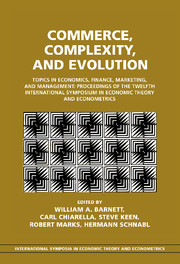 Commerce, Complexity, and Evolution
Commerce, Complexity, and Evolution Book contents
- Frontmatter
- Contents
- Series editor's preface
- Volume editors' preface
- Editors
- List of contributors
- I Philosophical and methodological implications of complexity and evolution in economic systems
- II Finance and the macroeconomy
- III Market and sectoral dynamics
- IV Marketing and interdependent behavior
- 15 A complex-systems simulation approach to evaluating plan-based and reactive trading strategies
- 16 Genetic algorithms and evolutionary games
- 17 Evolved perception and the validation of simulation models
- 18 The application of cellular-automata and agent models to network externalities in consumers' theory: a generalization-of-life game
15 - A complex-systems simulation approach to evaluating plan-based and reactive trading strategies
Published online by Cambridge University Press: 05 December 2011
- Frontmatter
- Contents
- Series editor's preface
- Volume editors' preface
- Editors
- List of contributors
- I Philosophical and methodological implications of complexity and evolution in economic systems
- II Finance and the macroeconomy
- III Market and sectoral dynamics
- IV Marketing and interdependent behavior
- 15 A complex-systems simulation approach to evaluating plan-based and reactive trading strategies
- 16 Genetic algorithms and evolutionary games
- 17 Evolved perception and the validation of simulation models
- 18 The application of cellular-automata and agent models to network externalities in consumers' theory: a generalization-of-life game
Summary
Should we plan for the future or should we react to the situation in which we find ourselves? Over the past decade this question has been increasingly asked in a number of academic disciplines and practitioner fields. It has arisen in the context of the design of autonomous systems, such as robots and software agents, in which the notion that systems based on reaction can achieve complex and robust behaviors has been argued forcefully by a group of workers (Brooks 1986, Agre and Chapman 1987, Agre 1988, Brooks 1991b) challenging the established planning-based paradigm (Fikes and Nilson 1971, Raphael 1976) that has proved to be computationally expensive and brittle (Brooks 1991a).
It has also arisen in the area of design of management systems (Johnston and Brennan 1996), particularly manufacturing operations systems (Johnston 1995), in which the influence of Japanese just-in-time reactive, or so-called pull, methods (Schonberger 1982, Monden 1983) have produced a strong challenge to western plan-based, or push, systems such as material requirements planning (MRP) (Orlicky 1975, Wight 1981) and optimized production technology, (Jacobs 1983, Goldratt 1988). Again the issue arises in inventory control (Jacobs and Whybark 1992) and in warehousing and physical distribution (Hummel and Stenger 1988). Even in strategic management the efficacy of planning has recently been challenged (Mintzberg 1994). The question is one of importance for management because planning systems generally require high levels of information technology investment and non-value-adding processes such as data collection.
Plans hold out the prospect of a good or even optimal performance in a predictable world but, being information intensive, are costly to implement.
- Type
- Chapter
- Information
- Commerce, Complexity, and EvolutionTopics in Economics, Finance, Marketing, and Management: Proceedings of the Twelfth International Symposium in Economic Theory and Econometrics, pp. 291 - 312Publisher: Cambridge University PressPrint publication year: 2000
